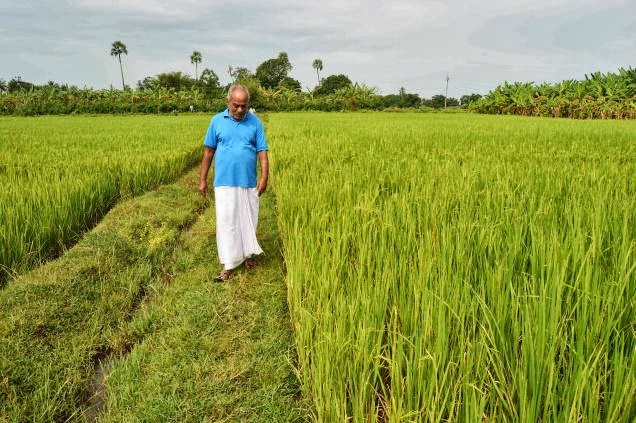Workshop on Conservation of Rice Diversity & Marketing of Organic Rice for Livelihood Improvement of Smallholder Farmers at IMAGE ,Bhubaneswar 0n 27th March 2013.
The state-level workshop titled “Conservation of Rice Diversity & Marketing of Organic Rice for Livelihood Improvement of Smallholder Farmers” started with welcome speech by Mr. Prasant Mohanty, Executive Director of NIRMAN. Mr. R.S Gopalan, IAS, Director of Dept. of Agriculture and Food Production, Govt. Of Odisha, Dr. Jafran Keshari Roy, former Joint Director & Renowned Rice Scientist of CRRI, Cuttack Odisha and Mr. Natabar Sarangi renowned Organic farmer and conservator of 365 varieties of Rice jointly inaugurated the event by watering the plant. Followed by, Mr. Prasant Mohanty addressed the need for the workshop and rich rice diversity of Odisha.
Gist of Mr Natabar Srangi's Speech follows
Mr. Natabar Sarangi elaborated the Rice Diversity of Odisha and shared his experience of conserving local rice varieties. He reiterated the rich diversity of rice in Odisha being the home for 35,000 indigenous varieties. Though, two-third of India’s population eats rice but the rice-diversity has declined significantly owing to Government’s focus on promotion of Hybrid rice. He denied the notion that indigenous varieties give poor yield. “Now farmers understand that potential indigenous varieties minimal yield ranges 15-16 quintal per acre in low land, 20-25 quintal per acre in medium land, 10-12 quintal per acre in upland.” Environmental pollution, soil degradation, and consumer health can be restored by not applying synthetic fertilizers and converting to organic farming practices. In states like, Punjab, Haryana, Western-Uttar Pradesh where soil quality has deteriorated to such an extent that they are being advised not to go for any other crops, except pulses. In spite of existing turmoil in agriculture sector, U.S. Corporatism has an influencing role in formulating the Agri-policy of India. Currently, Govt of India extends rampant actions to East Indian States like Assam, West Bengal, Odisha to bring in second Green Revolution., so we need to educate the farmers to go for indigenous rice. A large quantity of organic manure is a bottleneck issue for a farmer to go for organic farming, but if he strive to manage for the first 3 years, from fourth year onwards the yield increases as the soil enrich.He shared his experience of being an organic farmer that the basic technique of organic or sustainable farming- leaving 10-15 inch of stalk of paddy in the field, which rejuvenates the soil. Cow urine is the best treatment for pest and diseases attack. For the past 15 years, organic farming with indigenous varieties of rice sought is the only answer to save farmer, consumer, soil, water, and environment.
The details of the workshop can be fetched from the link :
http://www.nirmanodisha.org/publications/Report%20of%20the%20Workshop%20on%20Conservation%20of%20%20Rice%20Diversity%20%20&%20Marketing%20of%20Organic%20Rice%20with%20cover.pdf
The state-level workshop titled “Conservation of Rice Diversity & Marketing of Organic Rice for Livelihood Improvement of Smallholder Farmers” started with welcome speech by Mr. Prasant Mohanty, Executive Director of NIRMAN. Mr. R.S Gopalan, IAS, Director of Dept. of Agriculture and Food Production, Govt. Of Odisha, Dr. Jafran Keshari Roy, former Joint Director & Renowned Rice Scientist of CRRI, Cuttack Odisha and Mr. Natabar Sarangi renowned Organic farmer and conservator of 365 varieties of Rice jointly inaugurated the event by watering the plant. Followed by, Mr. Prasant Mohanty addressed the need for the workshop and rich rice diversity of Odisha.
Gist of Mr Natabar Srangi's Speech follows
Mr. Natabar Sarangi elaborated the Rice Diversity of Odisha and shared his experience of conserving local rice varieties. He reiterated the rich diversity of rice in Odisha being the home for 35,000 indigenous varieties. Though, two-third of India’s population eats rice but the rice-diversity has declined significantly owing to Government’s focus on promotion of Hybrid rice. He denied the notion that indigenous varieties give poor yield. “Now farmers understand that potential indigenous varieties minimal yield ranges 15-16 quintal per acre in low land, 20-25 quintal per acre in medium land, 10-12 quintal per acre in upland.” Environmental pollution, soil degradation, and consumer health can be restored by not applying synthetic fertilizers and converting to organic farming practices. In states like, Punjab, Haryana, Western-Uttar Pradesh where soil quality has deteriorated to such an extent that they are being advised not to go for any other crops, except pulses. In spite of existing turmoil in agriculture sector, U.S. Corporatism has an influencing role in formulating the Agri-policy of India. Currently, Govt of India extends rampant actions to East Indian States like Assam, West Bengal, Odisha to bring in second Green Revolution., so we need to educate the farmers to go for indigenous rice. A large quantity of organic manure is a bottleneck issue for a farmer to go for organic farming, but if he strive to manage for the first 3 years, from fourth year onwards the yield increases as the soil enrich.He shared his experience of being an organic farmer that the basic technique of organic or sustainable farming- leaving 10-15 inch of stalk of paddy in the field, which rejuvenates the soil. Cow urine is the best treatment for pest and diseases attack. For the past 15 years, organic farming with indigenous varieties of rice sought is the only answer to save farmer, consumer, soil, water, and environment.
The details of the workshop can be fetched from the link :
http://www.nirmanodisha.org/publications/Report%20of%20the%20Workshop%20on%20Conservation%20of%20%20Rice%20Diversity%20%20&%20Marketing%20of%20Organic%20Rice%20with%20cover.pdf

No comments:
Post a Comment